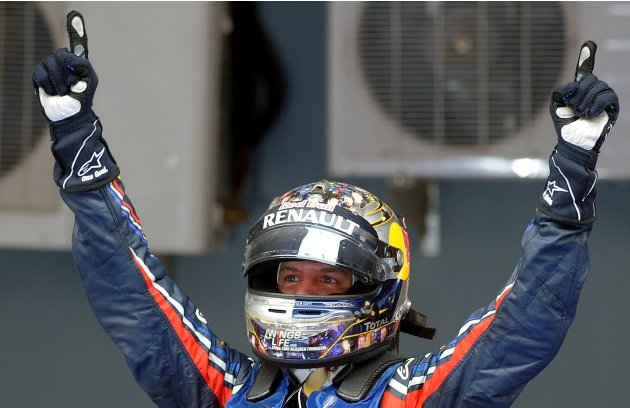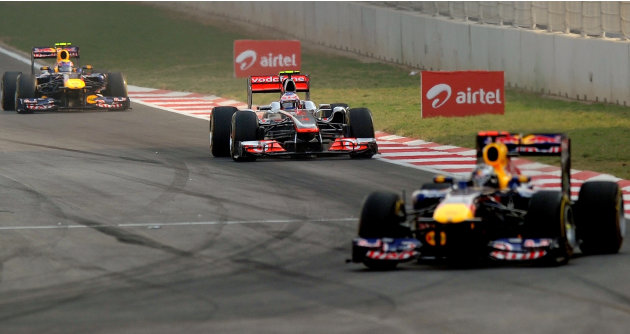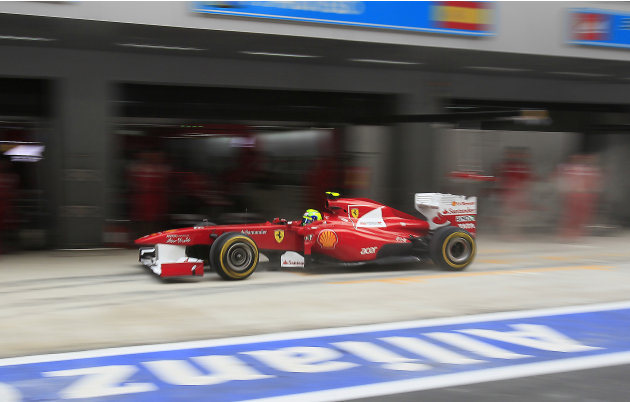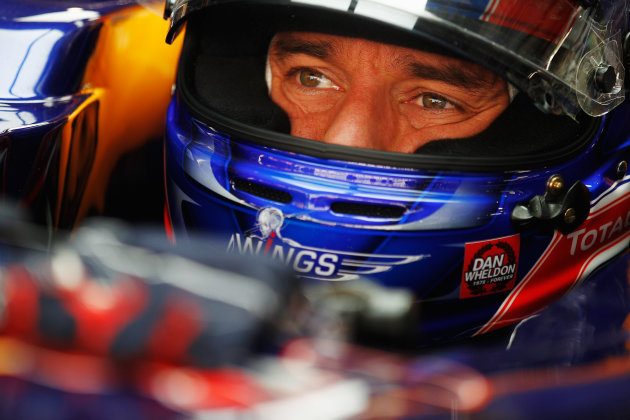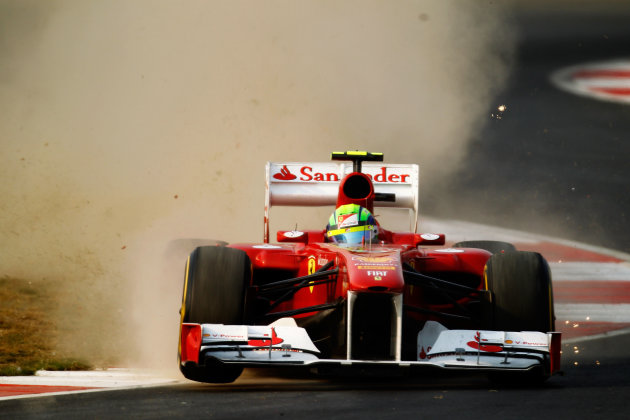Monday, October 31, 2011
Friday, October 28, 2011
Bomb found on Advani's yatra route in Tamil Nadu
Madurai, Oct 28 A pipe bomb was found under a bridge from which Bharatiya Janata Party (BJP) leader L.K. Advani' anti-corruption yatra was supposed to pass in Tamil Nadu near Madurai Friday morning, police said.
The second leg of the yatra began from Madurai Friday morning.
'Some people found the bomb under the bridge on which Advani was supposed to travel and informed the police,' a police officer said.
'We cordoned off the area and recovered the bomb,' he said.
The bomb was found in Alam Patti near Madurai, around 450 from Chennai.
Source: IANS via Yahoo News
Thursday, October 27, 2011
Google paid $151 million for Zagat - filing
The acquisition, which added a valuable brand to Google's content offerings and bolstered its push into the local commerce market, was one of 57 deals completed by the Web search company in the first nine months of 2011.
Google, the world's No.1 Internet search engine, has been acquiring companies at a rapid clip, as it moves to expand into new markets and adapt its product to a world in which consumers increasingly rely on mobile devices and social networking services to access the Internet.
Google also acquired Daily Deals, a privately held, German online coupon company, for $114 million in cash in September, Google said in the filing with the U.S. Securities and Exchange Commission. And it completed the acquisition of ITA Software for $676 million in cash in April.
Google said it completed 54 other acquisitions and purchases of intangible assets during the first nine months of 2011 for roughly $502 million.
During that same period in 2010, Google completed 37 deals for $626 million, excluding the acquisitions of Slide, AdMob and On2 Technologies, for which Google paid a combined $983 million.
Google announced its acquisition of Zagat Survey, which polls consumers and compiles reviews about restaurants, hotels and other businesses around the world, in September, but did not disclose a price at the time.
Google's largest deal to date, the planned $12.5 billion acquisition of mobile phone maker Motorola Mobility Holdings Inc is pending regulatory approval. Google has said it expects the deal, announced in August, to close later this year or early in 2012.
Source: Reuters
Nokia unveils first Windows phones
The two new smartphones, described as unexceptional by one analyst, will go on sale in key European markets by the Christmas holiday season and are the first plank in a strategy designed to return the Finnish giant to its former glory.
The top-end Lumia 800, featuring easy access to social networks like Facebook and high-definition video playback, will sell for about 420 euros ($584) excluding subsidies, less than Apple's latest iPhone but more than many Google Android phones.
It will also offer the full and free navigation service users crave.
The more basic Lumia 710 will cost about 270 euros.
"These devices are a good start but the reality is that they are pretty much plain vanilla Windows Phone products," said Ben Wood, director of research at UK-based telecoms analysis firm CCS Insight.
"These products are a positive start but it remains a Herculean task to recapture this lucrative market from Apple and Android."
Nokia, which has been left in the dust by Apple and Google in the booming smartphone market, decided to ditch its aging Symbian platform in favour of Microsoft's software in a risky deal that spooked investors in February.
The world's biggest cellphone maker said it would address the crucial U.S. and mainland China markets with new products next year.
Nokia also unveiled four new basic phones for emerging markets, where it still holds a leading position.
Nokia's market value has halved since February as investors are unsure whether it can ever regain the market share it has lost.
Its third-quarter results beat low expectations, sparking hopes that the company can survive a painful revamp, but smartphone sales still dropped 38 percent from a year ago.
The annual Nokia World media and industry event in London where the launch took place on Wednesday includes speakers from the world's largest carriers: China Mobile, Vodafone, Orange and MTN. ($1 = 0.719 Euros)
Source: Reuters
Sweden to host Facebook's first non-U.S. server site
The data centre in Lulea will be the largest of its kind in Europe, and the northernmost of this magnitude on Earth. It is Facebook's first in Europe and will serve more than 800 million site users.
"We concluded Lulea offered the best package of resources, including a suitable climate for environmental cooling, clean power resources, available land, talented regional workforce and supportive business and corporate environment," said Tom Furlong, Facebook's director of site operations.
Lulea is about 1,000 km north of the capital, Stockholm.
The data centre, to run primarily on hydropower, will consist of three server buildings, construction of which will begin immediately.
"The first building is to be operational within a year and the entire facility is scheduled for completion by 2014," the company added.
Source: Reuters
Half of students fear Facebook posts will affect job prospects
London, Oct 27 (ANI): A new survey has revealed that almost half of students are worried that personal details they have shared on social networking sites, such as Facebook, as well as elsewhere online, might affect their future career prospects.
The survey, carried out by YouGov for the Information Commissioner's Office (ICO), found that four out of 10 students (42 per cent) are concerned that Facebook postings could come back to haunt them in later life.
It also revealed that many students are not adequately protecting themselves against the risk of identity theft.
The researchers found that a third of students who have lived at several addresses while at university still have not arranged the redirection of their most important post to their current university address.
Two thirds of students have never checked their credit rating, allowing suspicious credit applications to go unnoticed.
"In tough times, young people are clearly less relaxed about privacy, particularly in relation to information that they post online - but many may not know what they can do about it," the Telegraph quoted Christopher Graham, the information commissioner, as saying.
The ICO study has been released to coincide with the launch of its new 'Student Brand Ambassador' campaign - a nationwide project aimed at raising young people's awareness of information rights.Source: ANI
Friday, October 14, 2011
Sunday, October 9, 2011
Nobel Peace Prize shared by three women
Saturday, October 8, 2011
Thursday, October 6, 2011
Q&A - What happens to Apple after Jobs?
Widely hailed as one of the greatest CEO's in history, Jobs handed the reins over to longtime operations chief Tim Cook in August, and many analysts believe the company is well-positioned for the future. But his death still leaves many questions.
Q: Can Apple succeed without Jobs?
Jobs' health had been an issue with investors for years (he was diagnosed in 2004), but that has not stopped Apple shares from marching higher. The stock moved little when Jobs announced in August that he was stepping down as CEO, and it moved little in after-hours trading after the announcement of his death Wednesday.
While both Cook and Jobs have earned reputations as hard-driving perfectionists, Jobs' successor is considered easier to work with. While Jobs was infamous for chewing out employees -- multiple stories have him firing workers in the elevator -- Cook is said to be better at forging consensus.
Whether and how Apple will transform under his stewardship is an open question. But Cook's success at Apple is due in large part to his sharing many of his boss's traits: a demand for perfection, an exhaustive attention to detail, and a hard-nosed attitude at the negotiating table.
Apple's Steve Jobs, visionary leader, dead at 56
Cook said in a statement that Apple planned to hold a celebration of Jobs' life for employees "soon".
APPLE, NEXT, IPHONE
Jobs death prompts grief at Apple stores in U.S., elsewhere
"They had a lot of time to prepare for the transition ... Tim Cook will continue his legacy," said Guilherme Ferraz, 44, a Brazilian businessman who was standing in front of a Manhattan Apple Store.
Keenen Thompson, a 21-year-old was in front of the Apple store in New York and said he would not leave until Apple's new iPhone 4S, unveiled earlier this week, comes out.
OBITUARY - Steve Jobs "may never be equalled"
Tributes pour in for Steve Jobs, dead at 56
SONY CEO HOWARD STRINGER
"The digital age has lost its leading light, but Steve's innovation and creativity will inspire dreamers and thinkers for generations."
AT&T CHAIRMAN AND CEO RANDALL STEPHENSON
"Steve Jobs is an inspiration to American entrepreneurs. He will be missed."
ARNOLD SCHWARZENEGGER, FORMER CALIFORNIA GOVERNOR, ON TWITTER
"Steve was truly a genius of our time, a man with a rare ability to fuse art and technology. In centuries from now, he will be remembered alongside Leonardo da Vinci."
MARK CUBAN, ENTREPRENEUR, ON TWITTER
"The PC era is officially over. #RIP #STEVEJOBS
INVESTOR MARC ANDREESSEN
"Today the world lost a visionary leader, the technology industry lost an iconic legend and I lost a friend and fellow founder. The legacy of Steve Jobs will be remembered for generations to come."
LARRY PAGE, CEO OF GOOGLE, ON GOOGLE+
"He was a great man with incredible achievements and amazing brilliance. He always seemed to be able to say in very few words what you actually should have been thinking before you thought it. His focus on the user experience above all else has always been an inspiration to me."
STEVE CASE, FOUNDER OF AOL, ON TWITTER
"I feel honored to have known Steve Jobs. He was the most innovative entrepreneur of our generation. His legacy will live on for the ages."
JEFF BEWKES, CEO OF TIME WARNER
"The world is a better place because of Steve, and the stories our company tells have been made richer by the products he created. He was a dynamic and fearless competitor, collaborator, and friend. In a society that has seen incredible technological innovation during our lifetimes, Steve may be the one true icon whose legacy will be remembered for a thousand years."
ARTHUR SULZBERGER, CHAIRMAN OF THE NEW YORK TIMES CO
"Steve Jobs was a visionary and a wonderful friend of The New York Times. He pushed the boundaries of how all providers of news and information interact with our users. I am among the many who deeply regret his passing."
JOHN RICCITIELLO, CEO OF ELECTRONIC ARTS
"Steve was one of a kind. For many of us working in technology and entertainment, Steve was a new kind of hero that lead with big, bold moves and would not settle for less than perfection. He is the best role model for a leader that aspires to be great."

